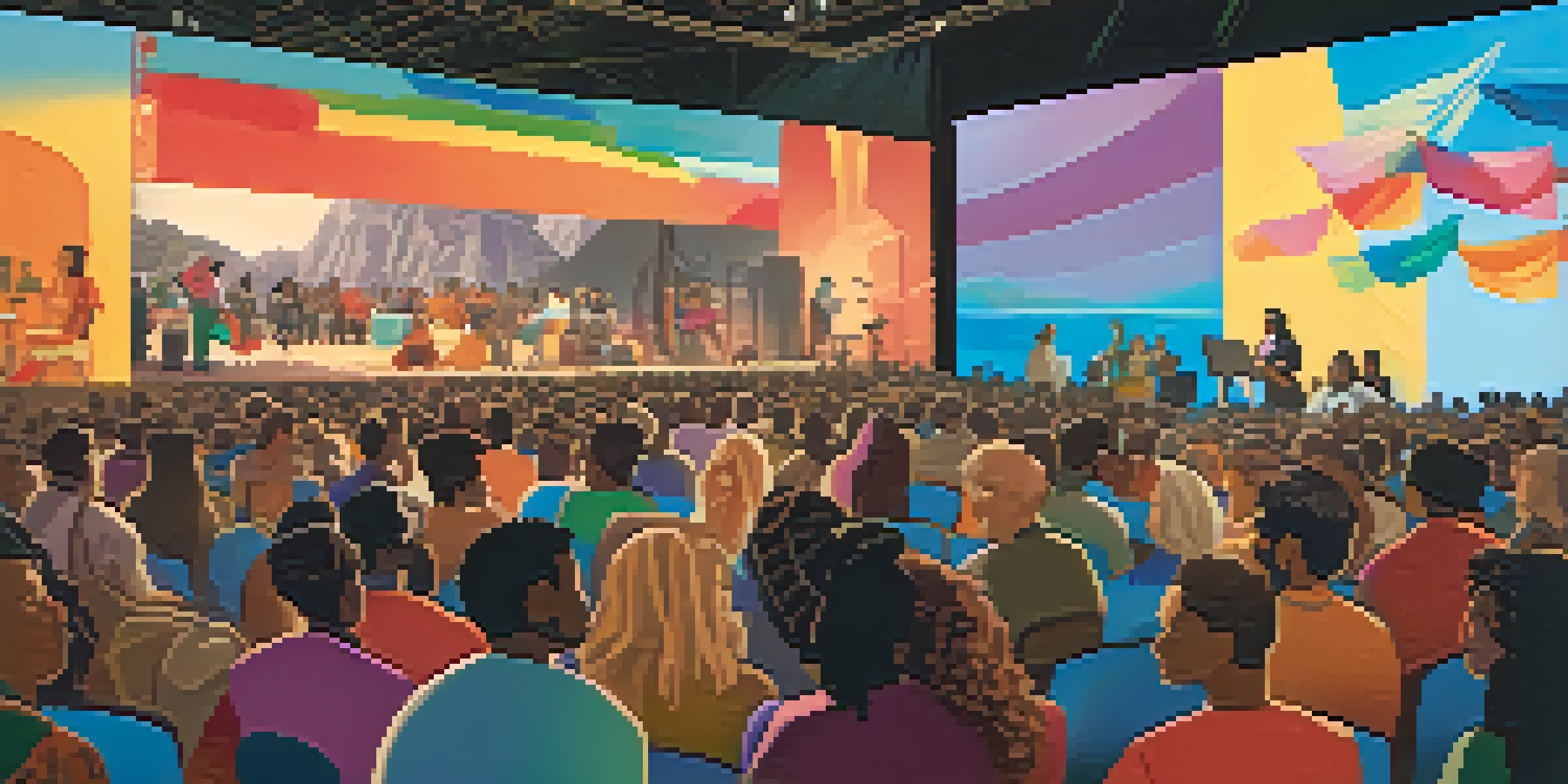Diversity in Storytelling: The New Wave of 21st Century Cinema

The Rise of Diverse Voices in Film
In recent years, we’ve seen a remarkable shift in the film industry as diverse voices are being amplified. Filmmakers from various backgrounds are stepping into the spotlight, bringing unique perspectives to storytelling. This shift not only enriches the narrative landscape but also resonates with audiences who crave authenticity and representation.
Diversity is being invited to the party; inclusion is being asked to dance.
One of the most notable changes is the increasing number of films directed by women and people of color. These creators are telling stories that reflect their experiences and cultures, which were often sidelined in mainstream cinema. As a result, we’re witnessing a broader spectrum of human experiences being portrayed on screen.
This new wave of filmmakers is not just about diversity in front of the camera but also behind it. With diverse writers, producers, and directors, the storytelling process becomes more inclusive, allowing for genuine representation that connects with a wide audience.
The Impact of Representation on Audiences
Representation matters—this phrase has become a rallying cry for many advocating for diversity in media. When audiences see themselves portrayed on screen, it fosters a sense of belonging and validation. This connection can lead to deeper emotional engagement with the story, making the viewing experience all the more impactful.

For example, films like 'Black Panther' and 'Crazy Rich Asians' not only achieved commercial success but also sparked conversations about cultural representation in Hollywood. Viewers from underrepresented communities felt seen and heard, which is a powerful outcome of diverse storytelling.
Diverse Voices Enrich Storytelling
Filmmakers from varied backgrounds are sharing unique perspectives that enhance narrative depth and audience connection.
Moreover, diverse representation challenges stereotypes and misconceptions, paving the way for more nuanced portrayals of various cultures. This not only benefits marginalized communities but also educates broader audiences, fostering empathy and understanding in an increasingly globalized world.
Cultural Authenticity and Storytelling
Cultural authenticity is crucial in conveying stories that resonate with audiences. When filmmakers draw from their own experiences and heritage, the narratives become richer and more believable. This authenticity invites viewers to engage more deeply with the film, as they are being presented with a genuine representation of a culture.
The stories we tell are a reflection of who we are and who we strive to be.
Take, for instance, the animated film 'Moana.' The filmmakers collaborated closely with cultural experts to ensure that the portrayal of Polynesian culture was respectful and accurate. Such efforts not only enhance the storytelling but also honor the traditions and values of the community being represented.
As audiences become more discerning, they seek out films that respect and reflect the complexities of different cultures. This demand encourages filmmakers to invest time and resources into developing authentic narratives, ultimately leading to a more diverse and vibrant cinematic landscape.
The Role of Streaming Platforms in Diversity
Streaming platforms have revolutionized the way we consume content, providing a unique opportunity for diverse storytelling to flourish. With the ability to reach global audiences, these platforms allow filmmakers to tell niche stories that might not have found a place in traditional theaters. This has opened the door for a wealth of diverse narratives that reflect the multitude of human experiences.
For instance, shows like 'Pose' and 'Ramy' have gained critical acclaim for their authentic representation of LGBTQ+ and Muslim experiences, respectively. By offering these stories a platform, streaming services have not only expanded their content offerings but also contributed to a broader cultural conversation.
Representation Fosters Connection
When audiences see authentic portrayals of their cultures, it creates a sense of belonging and emotional engagement.
Additionally, the algorithms of streaming platforms often recommend content based on viewer preferences, which can lead to greater exposure for diverse films and shows. As more viewers engage with these stories, the demand for diversity in storytelling will only continue to grow.
Challenges Facing Diverse Storytelling
Despite the progress made, challenges still persist in the realm of diverse storytelling. Many filmmakers face obstacles such as limited funding and support, which can hinder their ability to bring authentic stories to life. Navigating the traditional film industry can be particularly daunting for those from underrepresented backgrounds.
Moreover, even when diverse films are produced, they can sometimes be pigeonholed into specific genres or narratives that conform to stereotypes. This can restrict the creative freedom of filmmakers and limit the audiences' perceptions of what diverse stories can entail.
However, as audiences continue to demand more varied and authentic narratives, there's hope that these challenges will be addressed. The growing recognition of the importance of diversity in storytelling is prompting industry stakeholders to rethink their approaches and invest in a wider array of voices.
The Future of Storytelling in Cinema
Looking ahead, the future of storytelling in cinema seems promising, with a strong emphasis on diversity and inclusivity. As more filmmakers emerge from different backgrounds, the narrative landscape will continue to evolve, presenting a wealth of stories that reflect the complexity of our world. This shift not only enriches the viewing experience but also has the potential to reshape societal norms and values.
With technology advancing and the rise of independent filmmaking, there are more opportunities than ever for diverse voices to be heard. Filmmakers can now leverage social media and crowdfunding to share their stories, bypassing traditional gatekeepers in the industry.
Streaming Platforms Expand Diversity
Streaming services offer a crucial platform for niche stories, allowing diverse narratives to reach wider audiences.
Ultimately, the evolution of storytelling in cinema is a reflection of our society. By embracing diversity in narratives, we’re taking steps toward a more inclusive future that recognizes and celebrates the richness of human experience.
Celebrating Diversity Through Film Festivals
Film festivals have become a critical platform for showcasing diverse narratives and supporting underrepresented filmmakers. Events like the Sundance Film Festival and the Toronto International Film Festival prioritize inclusivity, providing a space for diverse stories to shine. These festivals not only celebrate creativity but also foster community and dialogue around important social issues.
Many festivals now have dedicated sections for films that focus on marginalized communities, helping to elevate voices that might otherwise go unheard. By highlighting these films, festivals contribute to a broader understanding of cultural diversity and the importance of representation in media.

As audiences attend these festivals, they are exposed to a range of perspectives that challenge their preconceptions and broaden their horizons. This celebration of diversity not only enriches the film industry but also enhances the cultural fabric of society as a whole.